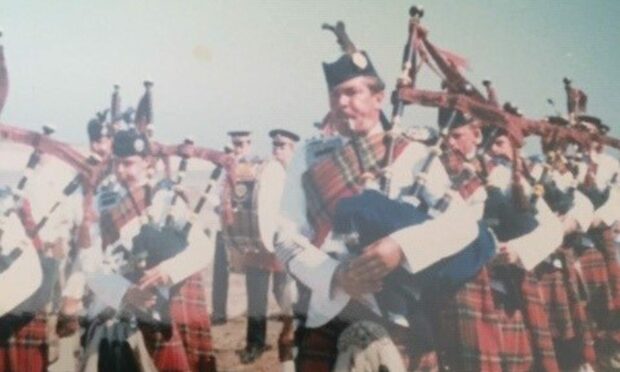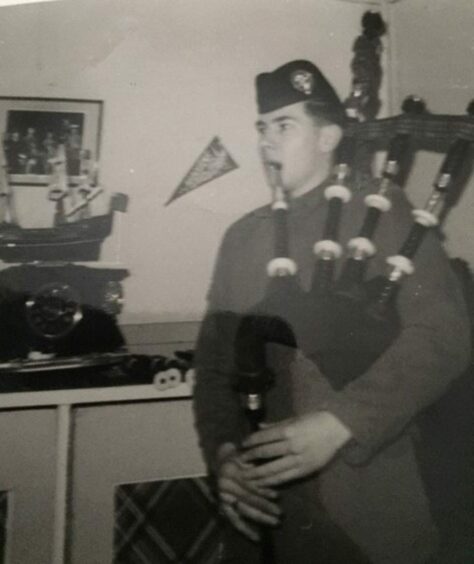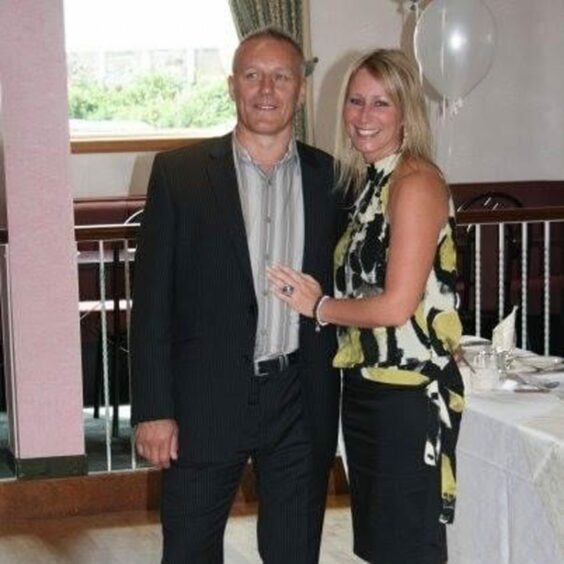The Falklands War changed the Scottish pipe major who wrote the Crags Of Tumbledown Mountain and he became “like a stranger” when he returned, his daughter has said.
Teri Newell said her father James Riddell came home “a different man” and was “more insular” after the war which saw 255 of his comrades die.
Stonehaven-born Mr Riddell is known across the world after composing The Crags Of Tumbledown Mountain on the back of a ration packet while under fire during the decisive battle, in which eight fellow Scots Guards were killed.
Shortly afterwards, he climbed to the top of the mountain to play it for the first time.
Mrs Newell, who was 14 at the time, said it was “wonderful” to see her father again at the end of the war “but he hardly ever spoke about what he’d been through”.
She added: “He seemed like a stranger, not my dad. He became more insular and never spoke about his experiences.
“I’m almost certain he had post-traumatic stress disorder, but it wasn’t recognised at the time.
“There was a lot of support for service families, but very little for the men. There was that attitude that you kept a stiff upper lip and just got on with it.”
‘When he heard about the ceasefire it was the most fabulous news’
Mr Riddell joined the Scots Guards aged 17, following in his father’s footsteps.
He married his high school sweetheart Pauline, and served in Malaya, Borneo, and Northern Ireland.
Mrs Newell, now 53 and living in Slough, Berkshire, with her husband Eric, was their only child, and at the time was living at Chelsea Barracks with other military families.
She said: “I was used to him being away, but this time it felt different. It was really quite scary.
“He was going off to war and I didn’t know if I’d ever see him again. Every day I would come home from school hoping there was something from dad. But you just had to get on with life.
“When we heard about the ceasefire it was the most fabulous news. But then the next day came the announcement of the fatalities.
“My mum remembers that, almost in a heartbeat, they went from elation to immense sadness.
“It was surreal – we wanted to celebrate but then we had friends and neighbours who had lost their husbands and fathers.”
‘Scribbled on the back of a ration pack’
When he returned, despite not speaking about his experiences, he revealed where he had written his now famous tune.
“He told me he’d scribbled the tune on the back of a ration pack,” Mrs Newell said. “He told me it just came to him. Things were obviously going through his head at the time, then it all came together.”
Mr Riddell served his country for 28 years, leaving the forces in 1991 with an exemplary conduct assessment and remembered by his comrades as well-respected and protective of the pipers under his command.
But he found himself struggling to adapt to civilian life, and the family became estranged when Mrs Newell was in her 20s. He died of a brain tumour in 1997.
She said: “When he left the military, he found it a very hard transition.
“He had been a soldier for all his adult life and was used to that structure and following orders. I think being on his own and having to find a job was a very scary prospect.
“I only spoke to him a handful of times after that, but he kept my number.
“Then one day, I got a phone call saying he had passed away. I didn’t even know he had been ill. That was the worst day of my life.”
Nationwide performance
On Saturday at 11am, pipers from across the UK, and around the world, will play The Crags Of Tumbledown Mountain to mark the 40th anniversary of the ceasefire.
Mrs Newell said she is proud her father’s memory lives on through his music.
“It’s amazing that so many pipers will be playing it on Saturday, it really warms my heart,” she said.
“Whenever I hear it, it brings a tear to my eye and reminds me of him. He was never interested in recognition, he didn’t want to be in the spotlight. But his tune means a lot to people around the world.”
The performance is part of remembrance events, organised by Legion Scotland and PoppyScotland. There will also be a parade through Edinburgh on Saturday.



Conversation